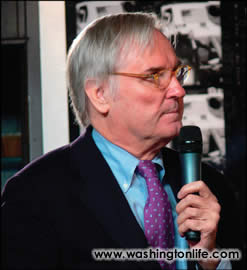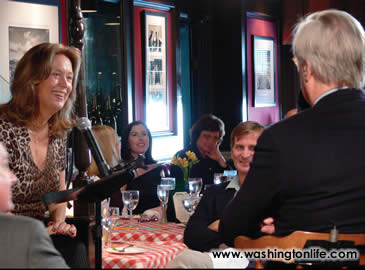
VERBATIM
David Patrick Columbia
The New York Social Diarist at The Q & A Café at Nathans
Booking celebrities for the Q&A Café at Nathans is always an adventure for Carol Joynt, although few are likely to match David Patrick Columbia. It was 2 o'clock of a June morning and, having a fitful sleep, Joynt went online to DPC's mustread New York Social Diary (nysocialdiary.com) – a thorough, photo-packed and entertaining web chronicle of Manhattan social life. Deciding on the spot that he would be an interesting guest, she fired off an email invitation, hoping to hear back at some point. Much to her surprise she got a reply at 2:30 a.m.: "Sounds good," Columbia responded.
CAROL JOYNT: You have been described as F. Scott Fitzgerald. Also as a "society darling and scribe." Your website, New York Social Diary, is a chronicle of life in New York, largely the social life, but not entirely because it's about books and art and Broadway, and the social order in many ways. Do you agree?
DAVID PATRICK COLUMBIA: I've been writing this column for about 14 years. It started in a magazine called Quest. Later, I was editor of a magazine called Avenue. Since I started the website, I became the editor of Quest, which publishes my column every month. Years ago, I read a diary of a man named George Templeton Strong who lived in the middle of the 19th century, and it was about what New York City was like then. I was so impressed by the vision of that man and the record that he kept inspired me to start The New York Social Diary.
CJ: Does the volume of content you have to produce dictate the numbers of parties you'll go to?
DPC: Sometimes I just can't get there because at six o'clock the body won't move out of the apartment. It's just sometimes too much. Then there are other times where there are very prominent charities that really do merit coverage, and so I make the extra effort to go. There are also wonderful things that happen in New York that I'd be a fool to not go to.
CJ: Have you ever clocked what your maximum number of parties came to in one day?
DPC: No, although the image readers have is that I go to many more parties than I do ...
CJ: How many invitations typically arrive in the mail on a daily basis?
DPC: It's so out of control that I actually have a woman helping me. I'm very bad about returning phone calls, and I'm very bad about answering invitations. Once upon a time when I first started, I was begging for invitations. If I didn't get one, I was really upset. Now, I don't even open the envelope, and I don't mean to say that I'm indifferent or blasé because I'm not.
CJ: Do you mind when an invitation comes via E-mail?
DPC: I don't care how it comes. Sometimes it has to come two or three times before it gets my attention.
CJ: Why do you think people don't R.S.V.P. anymore and how would you remedy that?
DPC: Etiquette has changed so dramatically in my lifetime, [but] that's just part of it. There are so many things people are invited to that there's a kind of an indifference that exists now. People take it for granted. We also live in a society that lacks courtesy.
CJ: You know, that famous Woody Allen line, "I don't want to be a member of a club that will have me as a member." Are there still some invitations you'd like to get?
DPC: I can't think of any invitation that I would like to get that I can't get. Sometimes things will occur that I haven't been invited to, and I'll think, "Why wasn't I invited?" And then I think, "Why in the hell do I care?"
CJ: What is the most exclusive invitation in New York society these days?
DPC: The most exclusive invitations in New York society these days are probably to somebody's house, and they're not inviting very many people.
CJ: What proportion of events on any given night in the season are genuinely private parties as opposed to parties where you have to pay to go?
DPC: There are very few private parties. In fact, people don't entertain at home very much anymore. Once upon a time, say, 40 or 50 years ago the art of the hostess was very, very important. Now it's promoted in magazines but actually it's not very artful because people don't entertain at home. If people entertain privately, they often do so in a restaurant.
CJ: Is New York still a hotbed of social climbing? Is the charity circuit still the best way for somebody who wants to make it in New York society?
DPC: The charity circuit in New York is the way to get yourself started, and it actually has been that way for quite some time.
CJ: And it is reigned over by what generation?
DPC: I've been doing this long enough now that I'm beginning to see the changing of the guard. The generation that still reigns is probably in their 40's and 50's, but the younger girls are coming up.
CJ: Once upon a time didn't a young socialite have a sponsor? There would be somebody already in society, whether it was a man or a woman or a couple who would introduce them around and sort of give them their blessing. It sounds to me like that doesn't exist anymore.
DPC: The process is not so unique now. It's more dynamic because there are more people. "Society" used to be considered people who came from the right family or were connected to the right family, and that would be your sponsorship. A little bit of that still exists in New York.
CJ: What about Caroline Kennedy Schlossberg and her husband?
DPC: I'm laughing about that because I was one of the first people in New York to write that there might be a problem in their marriage. [I had] a good source. The thing that's interesting about Caroline Kennedy Schlossberg is that she does live a very private life compared to many well-known New Yorkers. People were very quiet about Jackie. When she was dying, one of my friends went over to visit her, and she was burning her letters in the fireplace. This bothers me as an historian. The thing that was really remarkable about Jackie [is that] at the end of her life she lived with a man who was married, whose wife lived on the other side of the park, and everybody knew that and nobody said a word about it.
CJ: Did Martha Stewart ever make it in society? And if she did, did she come back?
DPC: Society as we know it now is very different from the society that Brooke Astor came into, or was born into. Martha Stewart is a good example of contemporary society. In New York society you start by getting people to see your face and know your name, and then you get around more and you get invited to more parties and then you get more selective about where you're going. Martha Stewart did all of those things. Her public personality on television is so warm and kind of homey and cozy, but off camera it is just ice, unless its someone who [is important]. Now when you see her people don't say, "Oh, there's Martha Stewart," like the lady I saw on TV who is such a big colossus. They say, "Oooh, there's Martha Stewart, the ex-jailbird."
CJ: Lloyd Grove is a hometown favorite, but his column in the New York Daily News didn't take flight?
DPC: Lloyd Grove had the misfortune of being hired by Mort Zuckerman who is not very dependable as an employer. His choices often are not well advised and not well thought out. Lloyd Grove had a hard road from the first day because of that. It must have been very difficult for him, and I don't think he was given a chance.
CJ: Has anybody ever offered to bribe you to get something in your column?
DPC: I don't think so. There are people sometimes who don't want coverage – Caroline Kennedy is a perfect example.
CJ: Does the Truman Capote experience tell a story about New York society that is not so attractive?
DPC: I know people who knew Truman for many years. They all speak of Truman very kindly and generously and with great affection. I interviewed a woman who was a manicurist for all of these fancy ladies, and she'd go from one apartment to the next, and she really hated Truman. I asked her, "Why do you hate him so much?" And she said because he would go and visit Mrs. Paley, and while she was doing Mrs. Paley's nails, he would sit on her bed and regale her with tales about Gloria Guinness and Slim Keith and this one and that one, all mean, nasty stories, and then he would go to Slim Keith's and do the same thing about the others.
The Q & A Café at Nathans Georgetown is open to everyone. For more information please visit www. nathansgeorgetown.com, located at the corner of Wisconsin and M Street.
CJ: His book Breakfast at Tiffany's is considered by many to be, a defining book about New York. Do you have books that you cherish as portraying the New York you know?
DPC: No. I love New York, and I love the history of New York, and when I say "the history of New York," I mean the history of New York right up until yesterday. I love Edith Wharton and F. Scott Fitzgerald and John O'Hara. I read gossip columnists. My father was a New Yorker and every day he got the Daily News and the Daily Mirror, and I was reading Walter Winchell when I was six years old, New York has always been magic for me.
 |
 |
NYSD's David Patrick Columbia comments on New York society
|
Carol Joynt interviews David Patrick Columbia at a sold-out Q & A Café. |
|



